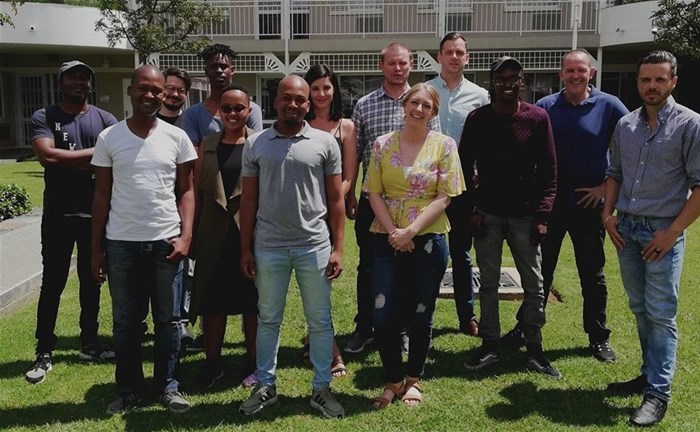Getting to the core of Algorithm Agency

With over 50 clients across multiple industries, Algorithm Agency works with agencies, SME’s and big business to drive the company's SEO and performance marketing efforts.
I recently chatted to Graeme Stiles, founder and managing director and Simon Lloyd, chief commercial officer, both of Algorithm Agency, to find out more about the agency's services, the set of tools they've developed, as well as overcoming some of the fears companies have in the era of the Fourth Industrial Revolution.
 Could you tell us a bit about Algorithm Agency?
Could you tell us a bit about Algorithm Agency?
Lloyd: We are a specialist digital performance agency that has centred everything that we do around data, processes, and automation. The best thing about digital is that there is so much to measure, but with that, comes the worst thing about digital: analysis paralysis.
So we have automated and simplified everything and built a proprietary toolset that tells a brand what is working or not working and how to beat the competition and ultimately grow the bottom line.
Stiles: We always say “be brilliant at a few things rather than average at them all” and this sums up our approach to what we do. Over the past few years the distinct fields of advertising and marketing have been drawn closer together and these now strongly overlap.
Increasingly algorithms and data play a key role in the success of a brands digital (and other) marketing efforts. Our role is to be the subject matter experts in the data and performance disciplines, that drive the broader success of a client's campaign.
 When and how did Algorithm Agency start?
When and how did Algorithm Agency start?
Stiles: I was previously at Quirk and seeing the shift there away from a performance marketing led approach towards a more creative focused business, I wanted to try to build something that focused on the performance side of digital marketing.
There seemed to be a gap in the market, there were a lot of agencies specialising in creative work, and a number of the large agencies focused on doing everything, but there was no dedicated agency looking at the performance and data disciplines, and this was the idea behind starting Algorithm.
For the first 10 months I worked from home and built a small client base and from there, things really took off. Simon then joined in the second year of business and we went from strength to strength and three office moves later we have a core team of 15 people.
Simon said it well, working with a close group of people of different skill sets have helped us grow, and Quirk attracted some very skilled digital folks and those relationships have helped us hugely.
Lloyd: It’s been a five-year journey really. Quite a few of the team are from the former agency Quirk, where we used to work together. It’s been great to build a business with a close group of talented individuals, we all knew our own strengths and weaknesses and have built the business around that. That’s a very rare opportunity, so we are very fortunate!
The layer on top of everything we do is data automation and visualisation so that we can strategically guide clients on how to optimise their online campaigns or strategy. What are some of the services you provide?
What are some of the services you provide?
Lloyd: So we focus on Search Engine Optimisation (content and website accessibility) plus web analytics and conversion rate optimisation (split testing).
We sometimes annoy clients because we only do those things. We want to be a master of a few things and not a generalist agency that tries to do everything “averagely”. This is why we stick to the science part and do not deviate into concept, creative and design. Being good at both the “art and science” of digital is problematic. They are specialisations.
 What roles do either of you perform in the company?
What roles do either of you perform in the company?
Stiles: As managing director, my role focuses on firstly building out scalable processes for our team to deliver best in class work and results. We are not a people-driven business - this was always the weakness in previous agencies that I worked at. You typically had one specialist and if they left the agency, the client's work would suffer.
Our approach has been to build a system that delivers results on a consistent basis regardless of who is working on the campaign. This has been a major focus of mine over the last three years. The second aspect to this role is building tools to give our team an edge in the work we deliver, we have a number of proprietary tools and reports that deliver data insights that support our client work.
Lloyd: I am the guy who drives all over Gauteng, meeting with clients and generating new client opportunities. I love being the storyteller of what is working and not working and then collaborating with clients to drive more ROI.
We are lucky to have a really strong team, led by our operations director, Ashley Watts; and our data director, Derik Nieman. Both of which we worked within our previous roles at Quirk. This enables us to specialise in what each of us does best and likes the most.
 We are currently in the Fourth Industrial Revolution. How has Algorithm Agency embraced this fusion of new technologies?
We are currently in the Fourth Industrial Revolution. How has Algorithm Agency embraced this fusion of new technologies?
Stiles: In our space, we are fortunate in a sense, as constant change and new tech is the norm and if you fail to keep up you are very soon irrelevant. Things like automation and AI are also key components in what we try to build into our work. On a daily basis, these are aspects that give Algorithm an edge in the market.
Our approach is to fully embrace these and then put a specialist human layer on top to combine the best of man and machine.
 Many companies are somewhat hesitant in embracing these new technologies. What advice do you have to overcome some of the fears companies have when it comes to automation and artificial intelligence?
Many companies are somewhat hesitant in embracing these new technologies. What advice do you have to overcome some of the fears companies have when it comes to automation and artificial intelligence?
Lloyd: Try not to procrastinate over costs for software or development. Rather take the elements of software and data, then design a business process around the story that the data provides. To run an effective digital ecosystem requires lots of different tools. There are so many good pieces of software that do a good job as part of the process, but the trick is to combine and simplify data to guide you to what is working or not working.
Simple automation and algorithms can be used to then prioritise the hundreds of things that need to be fixed. Nobody can fix everything, so we use scoring systems and processes to rank everything from high to low priority. Like the “how do you eat an elephant?” analogy - one piece at a time, but always in impact/priority order.
Rather use more software and automation and combine that with a few brilliant minds. Don’t fall into the trap of throwing people or hours at problems, humans are by default error-prone and can be lazy.
 I believe Algorithm Agency has developed an algorithm tool called Quant. Could you tell us more about what it is, how this came into fruition and how can companies benefit from it?
I believe Algorithm Agency has developed an algorithm tool called Quant. Could you tell us more about what it is, how this came into fruition and how can companies benefit from it?
Stiles: Quant takes its name from the shorthand for quantitative analyst and is more a suite of tools than one specific tool. Quant is the data layer and toolset that underpins all of Algorithms work.
Quant is led by our data director Derik and combines data science, business analysis and various tools and dashboards to create a practical data offering that clients can use to drive their marketing efforts. A recent example is the work Quant has done integrating SalesForce data in a client's digital reporting cycle and closing the loop from marketing efforts to sales results.
 We are in this era of big data. Could you tell us what this means to Algorithm Agency? And how important is it to businesses?
We are in this era of big data. Could you tell us what this means to Algorithm Agency? And how important is it to businesses?
Lloyd: We really dislike the term big data. Why? Because it implies complexity. Data is great, don’t get me wrong, but even small datasets can cause analysis paralysis. Our position is that big data is meaningless without simplicity and prioritisation. Data should not be presented in big ugly Excel tables, it should tell a story about the things that matter to a business. Ideally, datasets should roll up into a beautiful single page view, that drives a conversation about what actions to take and in which order of priority.
 Algorithms are predicted to be the future of business success. What is your opinion on this?
Algorithms are predicted to be the future of business success. What is your opinion on this?
Stiles: I think its broader than business success, algorithms in themselves are not new, and a simple definition is that an algorithm is a set of steps and instructions that guide a computer in solving a problem.
What is changing at a rapid pace is the technology into which we can place algorithms, everything from trading desks on the stock exchange through to Google Search and self-driving cars. As a business or even on a personal level, if we do not embrace these changes it will be very hard to be successful in the future.
 What are Algorithm Agency's goals for the year?
What are Algorithm Agency's goals for the year?
Simon: To use more software and automation. We don’t want to be a big agency with lots of people, we want to be the smart agency with great data and a small collection of senior experts. We work best with clients that are revenue (e-commerce) or leads focussed. Then we have something very focussed as a goal. If it does not drive more actions or sales then is it really worth doing at all?
To find out more about Algorithm Agency, go to www.algorithm.agency
About Evan-Lee Courie
- Q&A: Mic Mann talks SingularityU SA Online Summit 2020 - 6 Oct 2020
- #HumanTraffickingAwareness: Do you know your childs' exact location? - 15 Sep 2020
- #WomensMonth: 'Women can own powerful leadership roles' says Charmaine Houvet - 28 Aug 2020
- #WomensMonth: Karen Nadasen provides insights to how PayU South Africa is empowering women - 28 Aug 2020
- #WomensMonth: Petunia Ludick, "You are powerful and deserving of every opportunity" - 27 Aug 2020
View my profile and articles...



